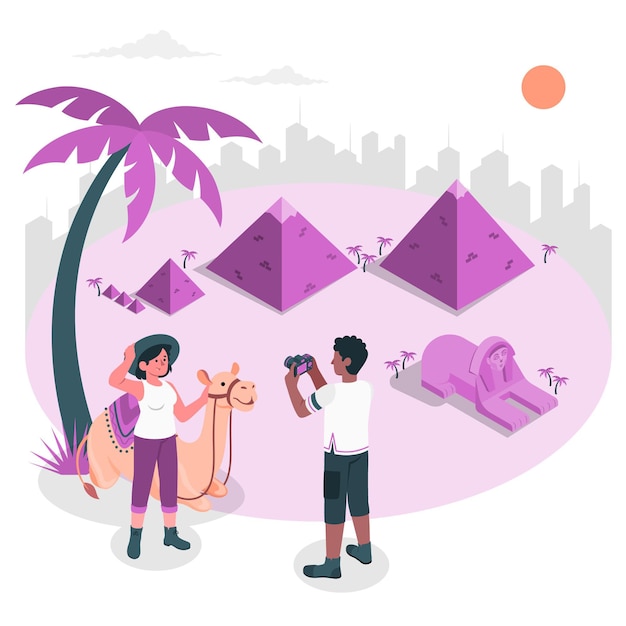10 Fascinating Facts about Ancient Egypt

Ancient Egypt was one of the greatest civilizations in history.
The Great Pyramid of Giza is the oldest and largest of the Seven Wonders of the Ancient World.
Cleopatra, the last pharaoh of Egypt, was actually of Greek descent.
The ancient Egyptians invented paper and writing with hieroglyphics.
The Nile River was the lifeblood of Ancient Egypt, providing water, transportation, and fertile soil for farming.
The Sphinx is a famous statue in Egypt with the body of a lion and the head of a human.
The Egyptian pharaohs were believed to be gods on Earth.
Ancient Egyptians believed in an afterlife and spent great efforts to preserve their bodies through mummification.
The Valley of the Kings is home to the tombs of many pharaohs, including Tutankhamun.
Ancient Egyptians worshipped a pantheon of gods and goddesses, including Ra, Isis, and Osiris.
The ancient Egyptians had a complex system of mathematics and were able to build massive structures with great precision.
The Pyramids of Egypt were built as tombs for the pharaohs and their families.
The ancient Egyptians worshipped cats and even had a goddess dedicated to them, Bastet.
The Rosetta Stone, discovered in Egypt, was key to deciphering ancient hieroglyphics.
Ancient Egyptians were skilled in medicine and advanced in areas such as dentistry and surgery.
The ancient Egyptians created an early form of makeup using minerals and oils.
10 Fascinating Facts about Ancient Egypt part 2
Egyptian hieroglyphics were a combination of phonograms, logograms, and ideograms.
Ancient Egyptians used papyrus plants to create a form of early paper.
The Egyptians worshipped the god Thoth, who was believed to be the inventor of writing.
Ancient Egyptian society was divided into social classes, with pharaohs at the top and slaves at the bottom.
The ancient Egyptians were skilled architects and engineers, building complex structures without modern tools.
Ancient Egyptians had a strong belief in the concept of Ma’at, which represented order, balance, and justice.
Ancient Egyptians loved playing board games, and many have been discovered in tombs.
Egyptians believed that the heart was the core of a person’s being, which is why it was left intact during mummification.
The ancient Egyptians were great sailors and traded with neighboring civilizations.
Women in ancient Egypt had more rights and opportunities compared to other ancient civilizations.
The Eye of Horus, a symbol of protection and good health, was commonly used in ancient Egypt.
Ancient Egyptians believed that the pharaoh was a living god, and his death marked the end of a cosmic era.
The ancient Egyptians celebrated numerous festivals throughout the year.
The ankh, a symbol resembling a cross with a loop on top, represented eternal life in ancient Egypt.
Ancient Egyptians were skilled in pottery, creating intricate and beautiful designs.
Ancient Egyptians believed that the tears of the goddess Isis caused the Nile River to flood, bringing fertility to the land.
The ancient Egyptians were skilled in textiles and created beautiful fabrics using various techniques.
The religious practices of ancient Egyptians influenced many aspects of their daily lives, including their architecture and art.
Ancient Egyptians believed that the heart was essential for the afterlife and would be weighed against a feather to determine the fate of one’s soul.
The ancient Egyptians used ostrich feathers as symbols of truth and justice.
Ancient Egyptian art often depicted pharaohs as larger than life, emphasizing their divine status.
The ancient Egyptians had a developed understanding of astronomy and used it for agricultural purposes and religious rituals.
Ancient Egyptian jewelry was highly detailed and often made of gold and precious gemstones.
Ancient Egyptians believed in the power of amulets, small charms worn for protection and good luck.
The ancient Egyptians had advanced knowledge of herbal medicines and used them to treat various ailments.
Ancient Egyptians had a strong belief in the power of spells and incantations for protection and healing.
The ancient Egyptians built intricate irrigation systems to make the most of the Nile River’s fertile soil.
Ancient Egyptians were skilled in metalworking and created beautiful jewelry and tools.
The ancient Egyptians had a complex calendar system and celebrated various holidays throughout the year based on astronomical events.

